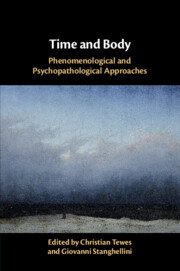Book contents
- Time and Body
- Endorsements for Time and Body
- Time and Body
- Copyright page
- Dedication
- Additional material
- Contents
- Figures
- Contributors
- 1 Introduction – Time and Body
- 2 Time, the Body, and the Other in Phenomenology and Psychopathology
- Part I Body and Time: General Aspects
- Part II Grief and Anxiety
- Part III Borderline Personality and Eating Disorders
- Part IV Depression, Schizophrenia, and Dementia
- 13 Intrinsic Temporality in Depression
- 13.1 Commentary on “Intrinsic Temporality in Depression: Classical Phenomenological Psychiatry, Affectivity, and Narrative”
- 14 Lost in the Socially Extended Mind
- 14.1 Commentary on “Lost in the Socially Extended Mind: Genuine Intersubjectivity and Disturbed Self-Other Demarcation in Schizophrenia”
- 15 Closing Up
- 15.1 Commentary on “Closing Up: The Phenomenology of Catatonia”
- 16 Embodied Selfhood and Personal Identity in Dementia
- 16.1 Commentary on “Embodied Selfhood and Personal Identity in Dementia”
- Index
- References
15.1 - Commentary on “Closing Up: The Phenomenology of Catatonia”
Catatonia, Intercorporeality, and the Question of Phenomenological Specificity
from Part IV - Depression, Schizophrenia, and Dementia
Published online by Cambridge University Press: 30 October 2020
- Time and Body
- Endorsements for Time and Body
- Time and Body
- Copyright page
- Dedication
- Additional material
- Contents
- Figures
- Contributors
- 1 Introduction – Time and Body
- 2 Time, the Body, and the Other in Phenomenology and Psychopathology
- Part I Body and Time: General Aspects
- Part II Grief and Anxiety
- Part III Borderline Personality and Eating Disorders
- Part IV Depression, Schizophrenia, and Dementia
- 13 Intrinsic Temporality in Depression
- 13.1 Commentary on “Intrinsic Temporality in Depression: Classical Phenomenological Psychiatry, Affectivity, and Narrative”
- 14 Lost in the Socially Extended Mind
- 14.1 Commentary on “Lost in the Socially Extended Mind: Genuine Intersubjectivity and Disturbed Self-Other Demarcation in Schizophrenia”
- 15 Closing Up
- 15.1 Commentary on “Closing Up: The Phenomenology of Catatonia”
- 16 Embodied Selfhood and Personal Identity in Dementia
- 16.1 Commentary on “Embodied Selfhood and Personal Identity in Dementia”
- Index
- References
Summary
In their contribution to this volume, Zeno Van Duppen and Pascal Sienaert (2021) develop an interesting and original phenomenological account of catatonia, which they take to apply to some but perhaps not all cases. They suggest that an experience of interpersonally or socially directed fear, originating in traumatic events, leads to a partial or complete loss of “intercorporeality” (bodily responsiveness to the movements, expressions, and gestures of others).
- Type
- Chapter
- Information
- Time and BodyPhenomenological and Psychopathological Approaches, pp. 363 - 366Publisher: Cambridge University PressPrint publication year: 2020

